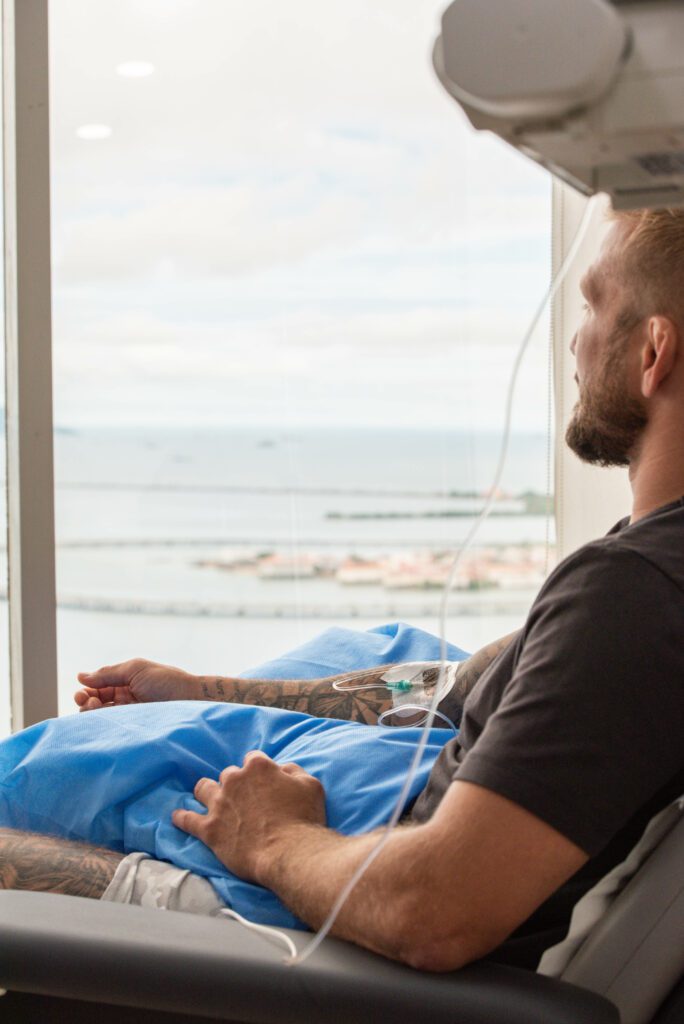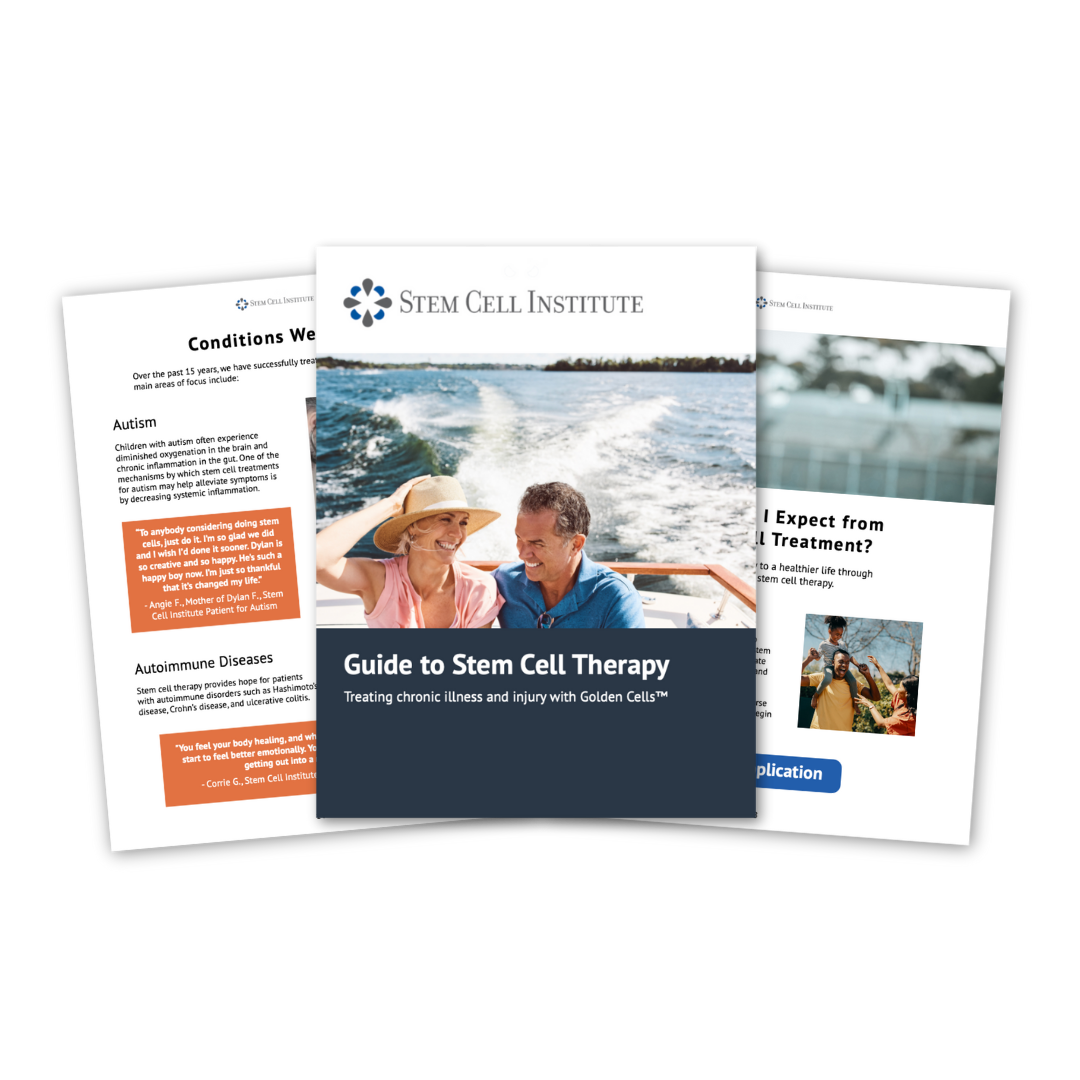Our Science and Research
For over 21 years, Stem Cell Institute has researched, developed, and delivered Advanced Adult Stem Cell Therapies. Explore what stem cells are, how they work, and how we use them to treat our patients.
SCIENCE OF STEM CELLS
Always At The Forefront of Applied Stem Cell Research
In order to incorporate the most recent advancements into patient care, we routinely interact with colleagues in the USA and internationally, many of whom are using stem cells in clinical trials. In conjunction with Medistem Panama, the laboratory founded by Dr. Neil Riordan, PA, PhD, we are always at the forefront of stem cell research.
Types of Adult Stem Cells
Adult stem cells can be extracted from most tissues in the body, including the bone marrow, fat, and peripheral blood. They can also be isolated from human umbilical cords and placental tissue. Once the cells have been harvested, they are sent to the lab where they are processed and assessed for quality before being reintroduced back in the patient. Common types of adult stem cells are mesenchymal and hematopoietic stem cells.
Umbilical cord mesenchymal stem cells reside in the *umbilical cords of newborn babies. HUCT-MSC stem cells, like all post-natal cells, are “adult” stem cells.
The Stem Cell Institute utilizes cord-derived mesenchymal stem cells that are separated from the umbilical cord tissue. For certain indications, these cells are expanded into greater numbers at Medistem Panama, the laboratory founded by Dr. Neil Riordan, PA, PhD, under very strict, internationally recognized guidelines.
Among many other things, mesenchymal stem cells from the umbilical cord tissue are known to help reduce inflammation, modulate the immune system and secrete factors that may help various tissues throughout the body to regenerate.*
*All donated cords are the by-products of normal, healthy births. Each cord is carefully screened for sterility and infectious diseases under International Blood Bank standards.
The bone marrow stem cell is the most studied of the stem cells, since it was first discovered to in the 1960s. Originally used in bone marrow transplant for leukemias and hematopoietic diseases, numerous studies have now expanded experimental use of these cells for conditions such as peripheral vascular disease, diabetes, heart failure, and other degenerative disorders.
Bone marrow is a good source of CD34+ stem cells (but a poor source of mesenchymal stem cells). Bone marrow-derived stem cells provide support for tissue regeneration via revascularization properties and their ability to support mesenchymal stem cells in the body.
Fat stem cells are essentially sequestered and are not available to the rest of the body for repair or immune modulation. Fat derived stem cells have been used for successful treatment of companion animals and horses with bone and joint injuries for the last 15 years with positive results.
Adipose tissue is a rich source of mesenchymal stem cells (MSCs) and T-regulatory cells which modulate the immune system. Adipose-derived cells can be used for treating systemic autoimmune and inflammatory conditions. They also play a role in regenerating injured tissue.
Over a decade ago, Stem Cell Institute pioneered treating patients with osteoarthritis, rheumatoid arthritis, multiple sclerosis, and other autoimmune diseases using fat derived stem cells. However, we no longer use a patient’s own stem cells from fat because we’ve found that mesenchymal stem cells from umbilical cord tissue are superior.
We go through a very high throughput screening process to find cells that we know have the best anti-inflammatory activity, the best immune modulating capacity, and the best ability to stimulate regeneration.”

Our Stem Cells and the US FDA
Human umbilical cord tissue-derived mesenchymal stem cells (MSCs) that were isolated and grown in our laboratory in Panama to create master cell banks have been used in the United States.
These cells served as the starting material for cellular products used in MSC clinical trials for two Duchenne’s muscular dystrophy patients under US FDA’s designation of Investigational New Drug (IND) for single patient compassionate use. (IND 16026 DMD Single Patient)
What type of cells are used in Stem Cell Institute's treatments?
Dr. Riordan published the first scientific article on treating humans (3 multiple sclerosis patients) with adipose-derived stem cells. We have treated many patients with adipose-derived mesenchymal stem cells in Panama but we no longer do so because we have found that umbilical cord-derived MSCs modulate the immune system and control inflammation better. HUCT MSCs also proliferate much more efficiently.
The body’s immune system is unable to recognize HUCT mesenchymal stem cells as foreign and therefore they are not rejected. We’ve treated thousands of patients with umbilical cord stem cells and there has never been a single instance rejection (graft vs. host disease). HUCT MSCs also proliferate/differentiate more efficiently than “older” cells, such as those found in the bone marrow and therefore, they are considered to be more “potent”. Like bone marrow, cord blood is source of CD34+ stem cells, but a poor source of mesenchymal stem cells. We no longer use cord blood-derived stem cells at Stem Cell Institute.
Stem Cell Collection
Umbilical Cord Tissue Collection
We receive cord donations from healthy women in Panama. Our donors sign a consent form, fill out a detailed questionnaire, and give a blood sample. The mothers’ blood undergoes extensive testing for HIV, STD’s, hepatitis, etc. Once we ensure the cords are free of all infectious diseases and 100% safe we process the tissue to extract the stem cells.
All donated cords are the by-products of normal, healthy births. Each cord is carefully screened for sterility and infectious diseases under International Blood Bank standards

Stem Cell Implantation
At Stem Cell Institute, stem cells are administered several ways depending on each patient’s ailment and physical condition. Patients typically receive a minimum of 3 stem cell applications during the course of an entire treatment protocol. Methods of administration include: Intravenous (IV), intramuscular, intrathecal, and intra-articular.
Intravenous (IV)
The safest and simplest method for delivering the stem cell throughout the body. Anesthesia is not required. We may use Lidocaine topical spray to needle prick area beforehand. IV administration usually takes about 20 – 30 minutes.
Intramuscular (IM)
The stem cells are injected directly into the muscle. Intramuscular implantation is very safe and does not require anesthesia.
Intra-articular (IA)
The stem cells are injected directly into the affected joint by a licensed physician. This method is commonly used for arthritis. Intra-articular implantation is quite safe and does not usually require anesthesia.
Intrathecal
Intrathecal administration is ideal for certain neurological conditions because the stem cells are injected directly into the spinal fluid past the blood-brain barrier. This enables them to reach the spinal cord and brain.*
*During the lumbar punctures procedure, an experienced anesthesiologist injects the stem cells into the spinal canal through the lower vertebrae under local anesthesia. All lumbar puncture procedures are performed under sterile conditions. Once inside the spinal fluid, the stem cells are able to gain access to the spinal cord and into the brain.
Lumbar puncture usually takes about 30 minutes.
You deserve the world’s leading adult stem cell therapy and research center.
For over 21 years Stem Cell Institute has provided Advanced Adult Stem Cell Therapies with a stellar reputation for safety and efficacy.

Download Your Guide to
Stem Cell Therapy
Have you wanted to explore stem cell therapy, but you’re not sure where to start? Our free guide answers the most common questions about what to expect, the science behind our proprietary Golden Cells™, and much more!
